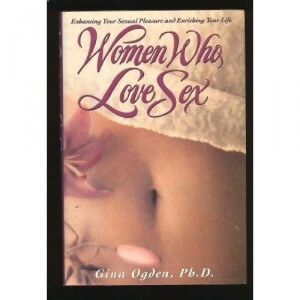 Women Who Love Sex: Ordinary Women Describe Their Paths to Pleasure, Intimacy, and Ecstasy, by Gina Ogden
Women Who Love Sex: Ordinary Women Describe Their Paths to Pleasure, Intimacy, and Ecstasy, by Gina Ogden
Once I started reading the book, I did not want to put it down. It is beautifully and succinctly written by a woman who has had to deal with her own inner ‘ghosts’ and discomforts with sexuality, who has sat with countless numbers of women, from the 1970s up to the early ’90s to understand their perspective, and who has and is leading the way for the many others to follow.
I was so engrossed with the book that I took it everywhere with me, even on the subway. Consequently, I received many curious looks by other commuters. I know this because I would, on occasion, look up to reflect on a point, only to find somebody, usually a woman, quickly lower their gaze, or abruptly turn away in embarrassment having met my eyes. I didn’t care. I wanted to shout from the rooftops: ‘Read this book! There is nothing to be ashamed about sex.’ Instead I silently evangelised and went about my business – holding onto Women Who Love Sex, feeling the pain and struggles of the women profiled and endeavoring to do more towards positive sexuality, specifically for females.
Published in 1994, Women Who Love Sex tackles the paradox of how ‘good girls’ are not supposed, not encouraged and/ or not taught to enjoy sex. We have all matter of conversations and discussions about female empowerment and gender equality, just not positive sexuality. Ogden has put in the work, having interviewed hundreds of real women over a span of twenty years. The ‘Alice’, ‘Maya’ and ‘Iris’ of the chapters are composites of individual women she met.
Ogden mentioned the handful of pioneers who produced sex- and woman-positive books including Betty Dodson on masturbation (Sex for One), Shere Hite on female sexuality studies (The Hite Report: A National Study of Female Sexuality), Lonnie Barbach on achieving the female orgasm (For Yourself), and then her struggle with finding more resources to recommend her clients. Indeed, there were few that emphasized on women connecting and integrating their sexual responses with the rest of their lives.
The interview questions of Ogden’s study were included. The academic side of me would have wanted to read the quantitative summary of the study leading to the book. I will be using the script for the guided imagery to induce orgasm in women found in Appendix B for my female workshops.
Ogden shared her insights on lust (and its role to a woman’s connectedness in their relationship), satisfaction (as a flowing continuum of pleasure, orgasm and ecstasy), extragenital stimulation (explorations beyond the vulva to all over the body), spontaneous orgasm (without physical touch), sexuality nurturing (need to give and receive), sexual intimacy (integrating romance, love and commitment). Each chapter elaborated on each of these insights.
The interview questions of Ogden’s study were included. The academic side of me would have wanted to read the quantitative summary of the study leading to the book. I will be using the script for the guided imagery to induce orgasm in women found in Appendix B for my female workshops.
Ogden concluded by saying that until we start defining pleasure for ourselves, we can be controlled by culture, and instead of waiting for culture to catch up with us, we can create a sexual revolution through our own critical mass of support. Change happens on a bigger scale when we change – when our understanding and reality of sex is not out of myth, coercision, moral proscriptions, and media hypes.
The Journal of Sex Research called this book “a masterpiece of affirmation-refreshing, moving, and extraordinarily liberating.” This book is certainly groundbreaking in moving beyond academic theories and concepts about sexology, to that of the way we approach female sexuality.
Though the book was published more than 10 years ago, I am not sure if much else has furthered the discussions of female sexuality. I would say this book was probably ahead of its time, and therefore an essential and necessary work for human service professionals and sexologists to read –probably more than once. I found it difficult to read the book straight through – being so emotionally affected, usually saddened, by what the women had to share.
Dr. Martha Lee is Founder and Clinical Sexologist of Eros Coaching. She is a certified sexologist with a Doctorate in Human Sexuality. She provides sexuality and intimacy coaching for individuals and couples, conducts sexual education workshops and speaks at public events. For more, visit www.eroscoaching.com or email drmarthalee@eroscoaching.com.

 Become a Patron!
Become a Patron!
